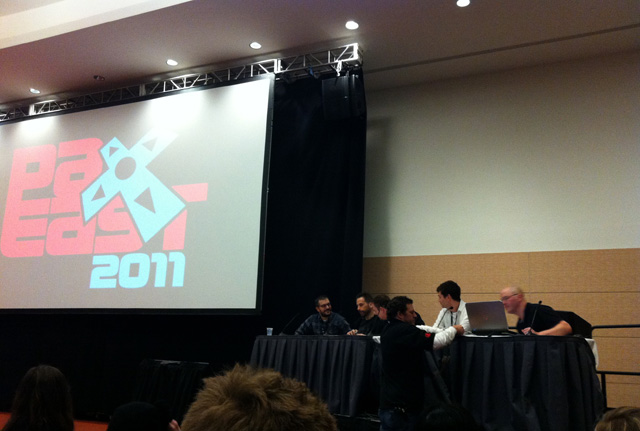
At this past Friday’s PAX East panel with Irrational Games, Ken Levine, Julian Murdoch, Shawn Robertson, Nate Wells, and Stephen Alexander shared insights into what it takes to create a living, breathing game world. The presentation revealed several previously unknown details about Bioshock‘s Rapture and Bioshock Infinite‘s Columbia, and what it took to make them feel like an important character all in themselves.
From both narrative and gameplay aspects, well-designed and executed videogame worlds are a crucial part of an experience, Murdoch explained. When developing Columbia, the team knew immediately that being “unBioshock” was the way to go. The turn of the century “city in the sky” concept was a ten minute decision in a board room; once presented, everyone agreed that it was the best direction for the sequel. “Let’s go!” was the overwhelming response.
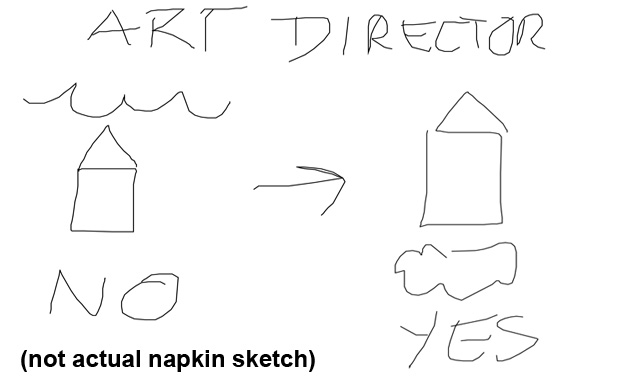
The (not actual) napkin sketch above is how the concept was presented.
Columbia represents the booming optimism of early Twentieth Century America. With technology booming, people believed that cities in the sky weren’t that unrealistic. Initially, the focus was going to be on the technological feverism, but the team felt that it was better off looking at some of the socio-political issues revolving around the dawn of America as a world power. Levine likened it to Erik Larson’s book The Devil in the White City, where the optimism of the 1893 Chicago World’s Fair was a coat of paint covering the difficulty of the changing American landscape.
The first designs for Columbia featured a dark, moody setting that wasn’t as forward-evolved from Rapture as the team had hoped for, and featured too much of a European influence in the architecture and visual design of the time. It appeared to be too much of a “foggy Paris night” and not enough of a New England afternoon. The conscious decision was made to look at American isolationism as a basis, with a “July 6th” blue sky kicking off the color palette.

In fact, it wasn’t until the first demo that they really figured out the city; the visual distance, buildings and landmarks, and scale were all mapped out then. This is thanks in large part to the skylines, the zipline-like rails that connect sections of the city together for quick movement. One of the first demos, which the team debuted at the panel, showed a rough but convincing take on how the skylines could be used. The characters could “fly” around Columbia with a hand free to fire a weapon at any enemies that were on the city’s platforms as they zipped by. The skylines needed to feel like a part of the city and not just an afterthought, so there had to be an element of fright to make the player really feel like they were hanging from a shaky structure several hundreds of feet in the sky. The sound effects had to be visceral, with audible wind and controller vibration being necessary elements.
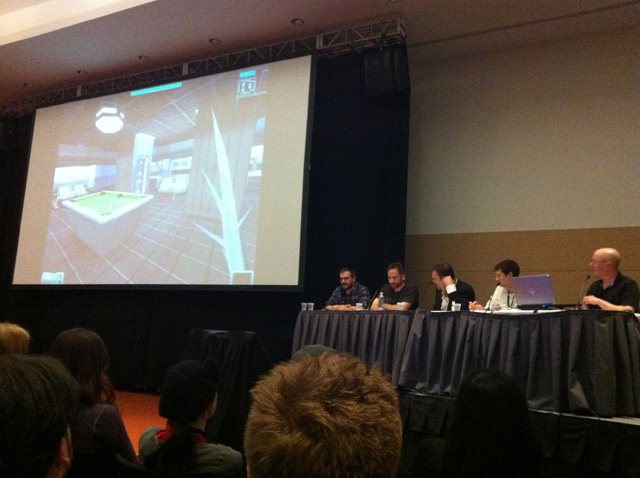
Like with System Shock 2 and Bioshock, telling a narrative through text in Infinite‘s Columbia would be like using a blunt force instrument. The story has to be told through actions and be visual, organic, and simple. The difficulties will come when reveling in influential elements of the era without minimizing the importance of the actual plot, but the team is looking forward to the challenge.
Some other points that the Irrational Games team revealed during the Q&A after their presentation:
- They love working on small scale set pieces, like rooms and offices, but that doesn’t happen until late in the process as assets aren’t compiled until then.
- By shifting from dead bodies and aggressive splicers, to “living” AIs in Columbia changed the default behavior of the gamer from shooting to anticipation.
- Without divulging too much, the team revealed that the European influence may not completely disappear from the game, and may show up in ways to portray the isolationism and growing resentment.
- On the possibility of a System Shock 3, Levine noted that all the right pieces would have to fall into place for it to happen, though it isn’t out the question. “Life is long and complicated, and you never know what’s going to happen,” noted Levine. [Editor’s note: Our fingers are crossed, and so should be yours.]



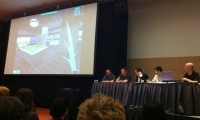

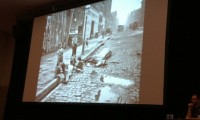



No Comments